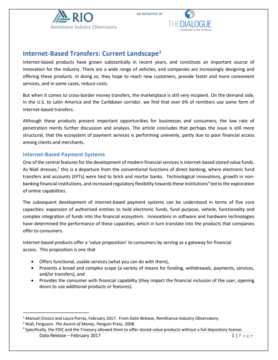Cuba 1.5?
When Yoani Sánchez started blogging, she probably did not anticipate the worldwide impact that her portrayal of life in Havana would have.
A Daily Publication of The Dialogue
The technologies that underpin the global Internet are largely products of the United States and grew out of U.S. research projects and companies that commercialized and innovated the technology, the Council on Foreign Relations said in a recent report. However, the global Internet has become “less free, more fragmented and less secure,” the report says, adding that countries around the world now exert more control over the Internet by localizing data, blocking content and launching political “influence campaigns.” What is the current state of freedom and openness on the global Internet, and how is it changing? What does control over the Internet mean for politics, economics and commerce in Latin America and the Caribbean? Which big players are exerting more—and less—influence over how the global Internet operates, and what policies are needed in order to shape a future that will be most productive for the digitization of the Americas?
Pedro Less Andrade, vice president of public policy for Latin America at Meta: “An open Internet promotes democracy. Its importance lies in the fact that it has empowered societies and generated new checks and balances over governments and companies, increasing their accountability. Consequently, totalitarian governments feeling threatened by this democratic spirit have altered the Internet’s global multistakeholder governance model, splintering the Internet we know into a subset of interconnected networks carved within their geographies to enhance surveillance and limit the free flow of information, including content or platforms citizens can access or publish. This Internet fragmentation is against its global ubiquitous architecture; it affects human rights and poses challenges to cybersecurity. Digital technologies have proven critical for businesses to stay afloat during the pandemic; consequently, small, medium and large companies accelerated their digital transformation. However, there is an urgent need in the region to close the digital gaps between territories, families, students, workers and companies. Smart and flexible policies that promote incentives for investment are needed to develop a more affordable bandwidth spectrum, increase access and ensure an appropriate balancing of safety and freedom of expression. Digital transformation can help the economies of Latin America and the Caribbean emerge from the crisis by stimulating business innovation and introducing new competitive conditions. It can also contribute to enhancing access to public services, including health and education, while improving governance, by placing citizens at the center of public policies. Any national regulatory approach to addressing harmful content should respect the global scale of the Internet and the value of cross-border communications. If designed well, these frameworks can contribute to the Internet’s continued success by articulating clear, predictable and balanced ways for government, companies and civil society to share responsibilities and work together. Designed poorly, these efforts may stifle expression, slow innovation and create the wrong incentives for platforms.”
Lourdes Casanova, senior lecturer and director of the Emerging Markets Institute at the Cornell S.C. Johnson College of Business at Cornell University: “According to the 2021 Freedom on the Net report, governments have imposed new rules to control content, data or competition for big technology companies in more than 48 countries. While governments should encourage an open Internet, the reality is that there is a global drive to control big technology companies. This drive to control is leading to a political, commercial and technological fragmentation of the Internet. Although the Internet was designed to be an open and global infrastructure, the current tendency to fragmentation is a driver and a result of the political realities in the world. China for instance is trying to have its own national standards in digital technologies. Russia is redesigning its Internet infrastructure (known as ‘RuNet’), to control Internet traffic across its domestic market. This trend has accelerated since the beginning of the war in Ukraine. Latin America cannot escape the global tendencies toward increased fragmentation of the Internet. Many countries in Latin America are being forced to implicitly or explicitly choose between the U.S. and Chinese Internet camps. Culturally, Latin America is closer to the United States, which has also exerted significant influence in the region. However, over the last decade China has risen to become the largest trade partner for South America. This is giving China significant leverage to influence the development of the Internet in the region. An example is the decision by many countries in the region to allow the use of Huawei equipment among the bidders within the 5G auctions despite the ban sought by the United States.”
Agustina del Campo, director of the Centro de Estudios en Libertad de Expresión y Acceso a la Información (CELE) and vice chair of the Global Network Initiative Board of Directors, and Jason Pielemeier, executive director of the Global Network Initiative: “The Internet today is both more threatened than ever and more vital than ever. Most observers, including a recent Council on Foreign Relations’ (CFR) task force, focus on the first truth, citing declining Freedom of the Net (FotN) scores as evidence of the inevitability of the ‘splInternet,’ and/or the need for more robust foreign policy and cyber responses on the part of Western governments. Yet the Internet continues to be a dynamic and ultimately liberating medium, particularly for those operating in closed societies. Assessing freedom and openness through a strict repressive vs nonrepressive dichotomy is counterproductive. Many proponents of the ‘open, interoperable Internet’ have been moving to restrict cross-border data flows, introduce content regulation and enhance online surveillance. In some Latin American countries, judicial authorities are getting frustrated with malfunctioning mutual legal assistance treaties, which create empathy for dangerous data retention or data localization proposals, while others are grappling with private online censorship driven by the adoption of foreign free speech standards. That their attempts to address these challenges are at times ineffective, disproportionate or unwise is often times more attributable to the lack of good models, insufficient consultation with civil society or poor legislative process, than it is to fidelity to an authoritarian vision of the Internet. Increasing digitization globally demands clear rules, better processes, new consensus and strong commitments. Collaboration across stakeholder groups, including co-regulatory approaches should be regarded as part of the solution. These efforts will help determine whether the ongoing, global push to regulate the Internet will completely neuter the characteristics that allow it to foster greater freedom of expression, or instead establish a new paradigm that fosters greater accountability—for individuals, companies and states—while enhancing human rights.”
Husani Durans de Jesus, senior manager of policy for the Americas at the Information Technology Industry Council: “The rate and breadth of digital transformation in Latin America continues to yield significant opportunities for individuals, communities and governments, but certain policy proposals have also raised some challenges when it comes to ensuring an open, interoperable, reliable and secure Internet for all. Recently, policymakers in countries like Chile, Brazil and Peru have introduced policies with the stated intent of addressing issues such as misinformation and data protection, but the approaches of these initiatives stand to have an adverse impact on trade, stifle innovation, restrict freedom of speech and contribute to Internet fragmentation, all without appropriately addressing the issue at hand. For example, proposals that force the localization of tech services and data ignore the range of flexible bases for facilitating the necessary movement and processing of data available in international data protection legislation, and stand to weaken the functionality and competitiveness of digital services offered in those markets. Political commitments such as the Declaration for the Future of the Internet, which set principles to promote human rights, the well-being of all individuals and a fair and competitive ecosystem, are a step in the right direction. After all, the cross-border movement of data and ICT goods and services is key to fostering democratic engagement in the global economy, as well as countering digital authoritarianism and protectionism that threaten innovation and free speech. It is therefore critical that the U.S., European Union, Canada and like-minded countries should prioritize cooperating and actively supporting an open, interoperable, reliable and secure Internet for all.”
Nathalia Foditsch, senior policy and regulatory specialist at the Alliance for Affordable Internet of the World Wide Web Foundation: “The Internet is a significant enabler of economic growth and human development, and a meaningfully connected population is more informed and engaged as well as more likely to have access to educational opportunities. All countries throughout the Americas have realized the importance of having sound policy and regulatory frameworks to allow for all individuals to have meaningful connectivity. However, not all of these countries have been able to successfully develop and/or implement these frameworks, or have sufficiently invested in the deployment of networks. Even countries that have significantly advanced their policies and regulatory efforts in recent years are generally diverse and unequal, and their general numbers frequently hide important information. Research developed by the Alliance for Affordable Internet shows that in Colombia, for example, while the affordability target of one gigabyte of data established by the U.N. Broadband Commission is met (less than 2 percent of the gross national income per capita), only 26.2 percent of the population in the country is meaningfully connected. This means that around one in every four people in the country owns a device and can connect to the Internet daily, with sufficient speed and data. Thus, debates around the deployment of mobile and fixed networks should not only be focused on the digitization of the productive sectors, but also address the urgent need of solving the access and connectivity gaps of the population.”
 The Latin America Advisor features Q&A from leaders in politics, economics, and finance every business day. It is available to members of the Dialogue’s Corporate Program and others by subscription.
The Latin America Advisor features Q&A from leaders in politics, economics, and finance every business day. It is available to members of the Dialogue’s Corporate Program and others by subscription.
When Yoani Sánchez started blogging, she probably did not anticipate the worldwide impact that her portrayal of life in Havana would have.
In what ways did the conference meet expectations and where did it fall short?
Internet-based products have grown substantially in recent years, and constitute an important source of innovation for the remittance industry. Although these products present important opportunities for businesses and consumers, the low rate of penetration merits further discussion and analysis. The article concludes that perhaps the issue is still more structural, that the ecosystem of payment services is performing unevenly, partly due to poor financial access among clients and merchants.
 The Internet has been splintered into “a subset of interconnected networks ... to enhance surveillance and limit the free flow of information,” Pedro Less Andrade writes below. // File Photo: John Schnobrich via Unsplash.com.
The Internet has been splintered into “a subset of interconnected networks ... to enhance surveillance and limit the free flow of information,” Pedro Less Andrade writes below. // File Photo: John Schnobrich via Unsplash.com.

